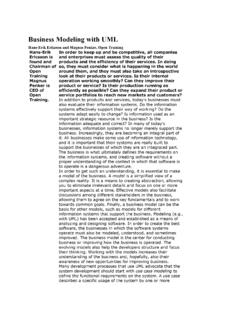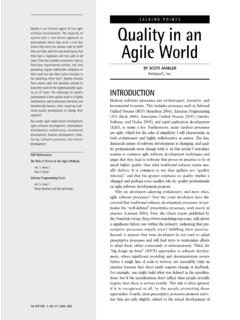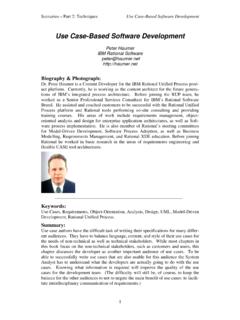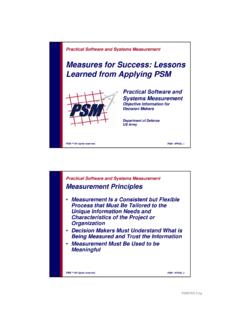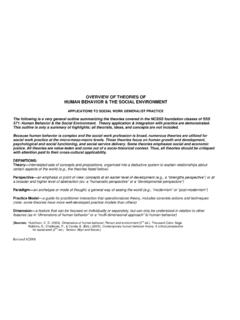Transcription of Paper 1 - Scope for organisational change in the p
1 Paper 1:What is the Scope fororganisational change in the publicsector in Europe?Kerstin Junge, Johnny Kelleher, Kari HadjivassiliouVersion Paper 1:What is the Scope fororganisational change in the publicsector in Europe?Kerstin Junge, Johnny Kelleher; Kari HadjivassiliouThe Tavistock Institute, London, England, 24thOctober 2006 Version for the eGovernment unit, DG Information Society andMedia, European "Think Papers" aim to present strategic issues that will be explored with stakeholders andresearchers. They are intended to be high-level summaries both of the issues and challenges,and of the ongoing work undertaken by the project team. They will be updated on the registered participants can contribute to interactive explorationsof definitions and Paper begins to unpick some of the characteristics of public sector organisations, theenvironment in which they operate (that is, what motivates and influences change processesin this sector) and begins to elucidate some of the implications for approaches toorganisational opinions expressed in this study are those of the authors and do not necessarily reflectthe views of the European Commission.
2 Reproduction is authorized, provided the source(eGovernment unit, DG Information Society and Media, European Commission) is clearlyacknowledged, save where otherwise Paper series editors: Trond-Arne Undheim and Professor Michael BlakemoreTABLE OF change IN THE PUBLIC SECTOR: CHALLENGES,DRIVERS AND What is organisational change ?.. Public sector idiosyncrasies .. And pressure for perpetual Approaches to public sector modernisation: an eclectic CULTURE: KEY FOR change CENTRIC DELIVERY OF PUBLIC SERVICES DREAMS UP ..1411 IntroductionOrganisational change practice and research aims at the improvement and development oforganisations for the purpose of enhancing effectivenessand responsiveness to externalchanges through better people management, competence, communications, systems andstructures1. It is not a discipline that has more practical relevance in one sector than inanother:the methods and approaches of the discipline are being applied in business andgovernment , public sector organisations are frequently presented as a special case inorganisational change research, portraying the impression that bringing about change issignificantly more difficult (and perhaps even impossible) in government organisations than itis in the private Paper begins to unpick some of the characteristics of public sector organisations, theenvironment in which they operate (that is, what motivates and influences change processesin this sector) and begins to elucidate some of the implications for approaches toorganisational argue that organisational change in the public sector is not a lost cause.
3 In fact, there isequal Scope in government for successful organisational change as in ,public sector organisations do have characteristics that make them distinct from organisational change does therefore not rely on the mere one-to-one transfer of tried and tested concepts from the private sector to government but rather translatingconcepts across sectors, testing their practical usefulness in context, and at timestransforming involves acknowledging and working with the idiosyncrasies of state (and quasi-state)bodies while holding on to the insight that there are methods and approaches of theorganisational change and development that are generic across the Europeanperspective this also means recognising the importance ofhistorically grown legal andinstitutional cultures shaping approaches to public sector also: Office of the Deputy Prime Minister (2005)An organisational Development Resource Document for LocalGovernment, , there is evidence that when the compatibility gap is large, there is greater likelihood that formalized techniqueswill be captured by and integrated into existing organizational dynamics (corruption of the technique) than that thetechnique will change these dynamics in a way consistent with its objectives (transformation of the organization.)
4 [Lozeeau, D. et al. (2002) The corruption of managerial techniques by organizations Human Relations, Vol. 55 No 5,May2002, p. 537].22 Key messagesThere is currently no model for organisational change specifically for the public sector. Aspecificgenericpublic sectormodelfor organisational change in public sectororganisationsmusttherefore be developed to help leaders in the public sector understandmore clearly the Scope for change towards citizen centricity .Private sector techniquesfor organisational changehave relevancein the public ,leaders in the public sectormusttranslatethese techniquesto suit the specificrequirements of public organisationsrather thansimplytransferthemif they are toachievethe objectives of their change organisations differ from those of the private sector in terms ofculture,orientation and tasks. change agents, both internal and external, mustthereforeunderstand and work with the grain of theculture of public sector this culture, and how it differs from that of businesses and between publicsector organisations is key for successful organisational changeOrganisational change strategies can havedifferent underlying paradigms: rational,normative and coercive.
5 When developing organisational change strategies, leaders in thepublic sector must balancethese three paradigms so that theirchosen approach reflectsboth the internal and externalcontext within which an organisation organisational change inthe public sector:challenges, is organisational change ?When we talk generically of the field of organisational change we are referring to both theacademic, scholarly study of organisations various known as Management Science orOrganisational Behaviour, and to a set of practical practices variously known as StrategicManagement, change Management, Management Consultancy and OrganisationalDevelopment (OD). These later sets of practices are associated with intentionality, withplanned change (or, more accurately, with planned change interventions or measures theinterventions or measures are planned, the change that results may be less so).
6 So, forexample, Cummings and Worley define OD as a system wide application of behaviouralscience knowledge to the planned development, improvement and reinforcement of strategies,structures, and processes that lead to organisational effectiveness change theory and practice is often usefully discussed in terms of threestreams of thinking and action: the rational; the normative; and the coercive. Crudelycharacterised:The rational(or rational-empirical ) involves the use of data and analysis to defineopportunites/issues/ problems and formulate strategies/approaches/ solutions . Thepredecessorsof the rational-empiricalare in scientific management normative(or normative-reeducative ) involves the establishment oforganisationalnormsand the training of organisational members tochange their understandings,orientations and behaviours. Itsrootsare in liberal education and coercive(or political-coercive ) involves benign or otherwise- leadership,compulsion or manipulation to achieve the objectives of actors with power within orover the organisation.
7 Itspredecessorsare military,religious and streams are often associated, respectively, with management consultancy/policydevelopment; organisational development/human resource development; and real world management/administration, but, of course, in theory and practice the three streams mingleand integrate. This is reflected in most of the standard generic models of what is involved inorganisational , and Worley, (2004)Organisation Development and change , 7th Edition (pg. 1), South-westernCollege Publishing co., Cincinnati, , when we refer to organisational Changein the context of this paperwe are referring tothe body of managerial and social science knowledge and practices concerning organisationalchange and development generally, and about improving and developing public institutionsand public services sector in the public realm differ from private ones intheculture they embody,orientation and tasks they perform.
8 It is somewhat of a clich to state that governmentorganisations tend to have a more bureaucratic culture than businesses- characterised asthey are, among others, by a more authoritarian management style based on the observanceof hierarchies, top-down management and tends to be based onrules and regulations and driven by the same time, the separation ofmanagement (that is, public officials) and control (that is, politicians) means that publicorganizations have less autonomy and flexibility at decision-making than privatecorporations. 5As one group does not have overall control over both agenda setting andexecution functions, capacity to implement is the same time, however, it shouldalso be remembered that it is bureaucracy(that is to say legalisticrationality (Max Weber))which has enabled western societies to create the modern states and liberal democracies welive in today and has ensured their largely effective and incorrupt note this toremind ourselves that less bureaucratic waysof doing thingsalongprivate sector lines caninvolve real dangers and disadvantages in public while the nature of bureaucracy has changed over the centuries and while ourunderstandings of it have changed and developed too, bureaucracy remains essential tothe functioning of contemporary society.
9 The key elementsof bureaucracyidentified byWeber- separation of role from person, hierarchy, rule basis, record keeping- remaincentral toall organisedorganisations and remainparticularlyessential to publicorganisations in democratic societies where transparency and equity are required of allpublic of what is trailed as an end to bureaucracy or an alternative tobureaucracy isself-evidently just another form of bureaucracy and not necessary animprovement. As we will see below, the New Public Management is no less bureaucraticthan traditional public managementnor is it necessarilymore effective andthismay haveparticular implications for how we might conceive a specificgeneric public sector modelfor organisational of the most important differences between business and the public sector is the purposeof these respective types of the provision of a set of key public services(such as health, education and security)7as a core function, public sector organisations4 Claver, E.
10 (1999) Public administration. From bureaucratic culture to citizen-oriented culture The International Journal ofPublic Sector management, Vol. 12 No 5, p. 4555 Claver, E. (1999) Public administration. From bureaucratic culture to citizen-oriented culture The International Journal ofPublic Sector management, Vol. 12 No 5,p. 4556 Elliott Jaques in(1976)General Theory of Bureaucracyand (1996)Requisite Organisationmakes clear for all largecomplex of a public service to be provided by government is itself culturally Germany the state as aprovider of services is more enshrined in people s minds than in Britain where citizens have less expectations of the state(Barlow, J (1996) "Steering not rowing. Co-ordinaton and control in the management of public services in Britain andGermany" International Journal of Public Sector Management, Vol. 9 No. 5/6, p. 76).5primarily exist to fulfil a public might be understood as 'serving the community'8or keeping order within the state, depending on the underlying understanding oftherelationship between state and citizen.
